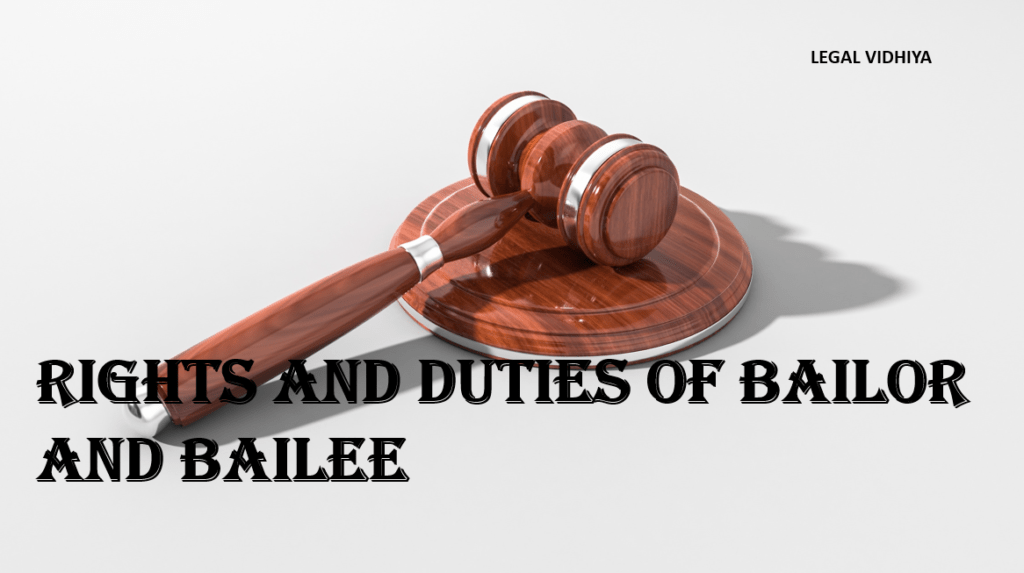
This Article is written by Ishita Jain of 2nd year of B.A LLB (Hons.) of University Institute of Legal Studies, Panjab University, an intern under Legal Vidhiya
ABSTRACT
A contract is an agreement entered into with two or more persons with their free consent. Parties to a contract are endowed with a subsequent responsibility or promise to do or not to do something, as per the conditions of the contract.
There are various kinds of contracts entered into on a daily basis. Bailment is a type of contract in which, one party delivers the goods to another for some purpose and on the fulfilment of which they are to be returned. Such contracts are very common and are entered into in our everyday routine, either orally or through written means. This article focuses on the rights and duties that are invoked on the parties under a contract of bailment.
KEYWORDS: Bailment contracts, Rights of bailor, Duties of bailor, Rights of bailee, Duties of bailee
INTRODUCTION
Section 148 of the Indian Contract Act, defines bailment as a type of contract, in which one party delivers some goods to another for a specific purpose and time period, after the completion of which they are to be returned. Transfer of possession or delivery of goods from one person to another is necessary for the fulfilment of an agreement under bailment.
In such a contract, the party who delivers goods to another is known as the bailor, and to whom the goods are delivered is referred to as the bailee. For constituting bailment, it is essential that there is
- delivery of goods for some purpose and
- After the work is done, they are either returned or disposed according to the bailor’s directions.
Both bailor and bailee are endowed with their respective rights and duties which they have to fulfill under a contract of bailment. They are being discussed below:
RIGHTS OF BAILOR
In a contract of bailment, the bailor is endowed with certain rights that he can claim against the bailee. They are as follows:
- To demand the return of the goods bailed –
In a contract of bailment, the bailor delivers the goods to the bailee for a particular purpose. The bailee is bound to return the goods back to the bailor on the fulfilment of the purpose or due to the expiry of the time for which they were bailed.
The bailor can claim compensation for the non-delivery of the goods from the bailee.
For instance, A delivers goods to B for repair. B is bound to return the goods when the repair is done. If B doesn’t deliver the goods after the work is completed, then A can ask for compensation from B for any loss he suffers due to the non-delivery.
- Compensation for damage or loss of goods-
The bailor can claim compensation from the bailee for any damage or loss suffered in the goods being bailed. If the bailee doesn’t take reasonable care of the goods bailed, due to which damage occurs, then the bailor is entitled to get compensation for the same.
For instance, in case of theft or some negligent act of the bailee the goods are lost or damaged, the bailor can claim compensation for the loss.
- Claim of Damages for unauthorised use-
If the goods bailed are used for some purpose other than for which they were bailed, due to which the goods get damaged, the bailor can claim compensation for the same.
For instance, A (bailor) rents his car to B (bailee). However, the car is used by C and during that unauthorised use an accident takes place due to which the car gets damaged. Here, A can claim compensation for the damage from B.
- Termination of contract-
As mentioned in Section 153, the bailor has a right to terminate the contract if the bailee indulges in some malpractice or doesn’t fulfil the conditions of the contract.
- Claim any gain on the goods bailed-
The bailor of the goods has the right to claim any profit or increase which may arise while the goods are bailed to the bailee.
For instance, A transfers the possession of the farm to B for a certain time period. So, if the farm animals produce any offspring, they would belong to A.
DUTIES OF BAILOR
Along with the rights that a bailor has, he is also supposed to deliver the duties that he has towards the bailee. Duties of the bailor are:
- To disclose the defects in goods bailed–
Section 150 states that, the bailor has a duty towards the bailee to disclose the defects in the goods bailed.
In a case of gratuitous bailment or bailment without reward, it is the bailor’s duty to disclose the defects which are known to him and which can expose the bailee to some risk. If the bailor fails or is unable to disclose such facts due to which some damage occurs to the bailee, the bailor would be held liable to compensate for the same.
In a case of non-gratuitous bailment i.e., bailment for reward, like that of hire, the bailor is held responsible for compensating the bailee for any loss that he may have suffered, due to any defect in the bailed goods, whether the bailor is aware of such defects/faults or not.
- To compensate the bailee for expenses incurred-
In a contract of bailment, the bailee does something for the bailor upon his instructions. The expenses that the bailee incurs while performing his part are to be compensated by the bailor. It is the bailor’s duty to pay the due remuneration to the bailee for rendering his services.
- Compensation in case of extraordinary expenses–
It is the duty of the bailor to compensate the bailee for any loss or damage that he may suffer due to the bailor’s conduct. In cases where the bailor asks for the return of goods even before the time of expiry, if due to this the bailee suffers from any loss, it is the duty of the bailor to compensate the bailee for the same.
RIGHTS OF BAILEE
Bailee is the one to whom the goods are transferred for some particular purpose. The bailee is also bestowed with certain rights that he can exercise. They are mentioned below.
- Recovery of necessary expenses-
Section 158 of the Indian Contract Act states that it is the right of the bailee to receive remuneration for the service he renders. If the bailor fails to pay the due remuneration, the bailee has the right to claim the same from the bailor. The bailor has to remunerate the bailee for the expenses he incurs under a contract of bailment.
For instance, A delivers his grinder for repair to B. On the completion of the repair, A doesn’t pay B for the same. B has a right to claim the necessary expenses that he incurred for the repair of the grinder from A.
- Compensation from the bailor-
In certain cases, the bailee suffers from some loss due to the bailor’s fault, a defect in title due to which he is not allowed to make bailment, receive back the goods, or give directions concerning them. As stated in Section 164, under such circumstances, the bailee has a right to get compensated for such loss from the bailor.
- Right of lien-
Under a contract of bailment, it is the right of the bailee to get his due share for the services that he provides. However, if the bailor refuses to pay the due remuneration of the bailee, then the bailee can exercise his right of lien over the goods bailed. Under a right of lien, the bailee can retain the goods of the bailor until his due remuneration is paid. Lien is further of two types:
- Particular lien – Section 170, talks about the right of particular lien of the bailee. Under this right, the bailee can retain those goods which are bailed to him, for which he renders his services but the remuneration for the same is not paid. In particular lien those goods are retained, regarding the service of which remuneration is due.
For instance, B under bailment delivers his cloth to A for dyeing. Here, A has the right to exercise lien over the cloth until the remuneration for his labour and skill is paid to him.
Also, once the goods are parted with, the right of lien over them comes to an end. So, if the same goods come under his possession, he cannot claim his right of lien over them. Parties during the formation of contract may exclude this right from being exercised.
For instance, A and B at the time of contract decided to exclude the right of lien from being exercised. If A delivers his goods to B and on the completion of the purpose takes the goods back without paying B, his remuneration. In such a case, B cannot claim anything by exercising lien over the goods.
- General lien– Certain bailees are conferred with the right to exercise general lien on the goods. General lien of goods means that the bailee has the right to retain not only the bailed goods but also, any other goods in his possession which belong to the bailor.
Section 171, states certain bailees who can exercise this right:
- Bankers: They have a right to retain the goods for a general balance of accounts. This lien can be exercised over cheques, bills, recovery of debt, etc. It is essential that the banker acts in good faith and without any defect in his title.
- Factors: Section 2 (9) of the Sale of Goods Act, defines a factor as a mercantile agent. His work is to sell the goods of the bailor which are in his possession. A factor has a right of general lien over the goods of his bailor or principle until his due is paid.
- Wharfinger: A person who owns or takes care of a wharf, i.e., a loading stage used for load and unload of vessels. A wharfinger can exercise his right of general lien on the goods which he has received in his capacity as a wharfinger.
- Attorneys: They can claim their remuneration by retaining the essential files or documents of their clients until their due expenses are paid.
- Policy Brokers: An insurance agent or policy broker can exercise this right to collect their due share from the client.
- Right to sue a third party–
Section 180 states that the bailee has the right to sue a wrongdoer, who deprives him of the possession of the goods or causes any damage to the goods bailed. Therefore, both the bailor and bailee can file a suit against the third party for the damage caused.
DUTIES OF BAILEE
There are certain duties which the bailee has to fulfil under a contract of bailment.
- Reasonable care of the bailed goods-
The bailee, who possesses the goods of the bailor is bestowed with a duty to take reasonable care of the goods bailed. Section 151 states that, the bailee is to take care of the goods bailed, like a man of ordinary prudence would take of his own goods. The duty of care required on the part of the bailee is the same, whether it be a gratuitous or non-gratuitous bailment.
For instance, A gives his belongings to B for safe custody for a certain time. However, it was seen that the goods that were delivered were not in their original state, i.e., B did not take reasonable care of the goods. A claimed compensation, B stated that he took the same care of the goods like he does of his own goods. But A was entitled to compensation as the standard of care required is that of a reasonable man.
Section 152 states that, if the bailee has taken due care as a reasonable man would, he cannot be held liable to compensate the bailor in case of any damage or loss which occurs to the goods.
In the case of Shanti Lal vs Tara Chand[1], the bailee had taken the necessary care that a man of ordinary prudence would, but due to a natural calamity, the goods were damaged. It was held that the bailee cannot be made liable for such a situation which is beyond human control and where he had taken reasonable care like a prudent man.
- Not to make unauthorised use-
Under a bailment contract, the bailee is bound to use the bailed goods only for some specific purpose, if he indulges in any use other than for which the bailment was made, the bailor may either repudiate or terminate the contract or claim compensation in case of damage which occurs due to such use. These remedies for the bailor have been stated under sections 153 and 154 respectively.
For instance, B gives his car to A for repair. Instead of doing repair, he uses the car for his own purpose and while doing the same gets into an accident. Here, it is the duty of A to compensate B for the damage that occurred.
- Not to mix the bailed goods-
It is the bailee’s duty not to mix the bailed goods with his own goods.
Section 155 states, that if the goods are mixed with the bailor’s consent, then both the bailor and bailee will have an interest according to their share in the mixture. If the goods are mixed without the consent of the bailor, then the bailee would have to compensate according to the nature of the goods.
Section 156 states that, if the goods are mixed without the bailor’s consent, however, they can be separated, then the cost of such separation is to be borne by the bailee.
Section 157 deals with cases in which the goods cannot be separated. In such cases, the bailee has to compensate the bailor for the loss that he suffers due to the unconsented mixing of goods.
- Duty to return the goods-
It has been stated under section 160 that, it is the duty of the bailee to return the goods to the bailor on the completion of the purpose for which the goods were bailed. If the bailee fails to deliver the goods at the appropriate time and due to which the bailor suffers from any loss, then it is the bailee’s duty to compensate the bailor, according to section 161.
In the case of J.K. Oil Mills vs. Union of India[2], there was a consignment of mustard oil to be delivered from Kanpur to Calcutta. During the transportation, the authorities seized the oil as it was found to be adulterated. The bailor sued the bailee for not delivering the oil at the stipulated time. It was held that the bailee was not liable for the failure of delivery of the goods to the bailor, due to the intervention of law.
Section 166 states that, if the bailor’s title is defective, and the bailee delivers the goods to the bailor, then he cannot be held liable to compensate the owner of such goods. It is the duty of the bailee to return the goods to the bailor even though his title is defective. The bailee cannot refuse to return the goods due to the defective title of the bailor.
- Deliver the increase or profit on the bailed goods-
The bailee is entitled with the responsibility to deliver back any increase or profit that accrued on the goods of the bailor. The increase or profit could be in relation with animals, shares, property etc.
CONCLUSION
In a contract of bailment, it is essential that the goods are delivered for some purpose and specific time, after the completion of which they are to be returned. There are two parties in a contract of bailment, one is known as the bailor and the other is the bailee. They both have certain rights as well as duties which they have to fulfil. This article was focused on these rights and duties.
REFERENCES
- 15th Edition, R.K. Bangia, Indian Contract Act, Allahabad Law Agency (2016)
- 13th Edition, Avatar Singh, Contract and Specific Relief, Eastern Book Company (2022)
- https://indiankanoon.org/ ( last visited- 13-09-23)
[1]A.I.R. 1933 All. 158
[2]A.I.R. 1976 S.C. 227




0 Comments